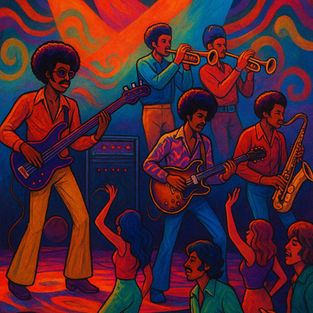
Photo- Getty Images
The Legacy of Led Zeppelin in the 1970s
Examining how Led Zeppelin changed 1970s rock with their tremendous sound, mystique, and unparalleled influence on subsequent generations of performers.
7 October 2025
Few bands have had as profound an impact on 1970s rock as Led Zeppelin. The group, consisting of Jimmy Page, Robert Plant, John Paul Jones, and John Bonham, emerged from the ashes of The Yardbirds and redefined not only a decade but also what rock music could be. Their blend of blues, folk, mysticism, and thunderous guitar riffs laid the groundwork for what we now call hard rock and heavy metal, influencing an entire generation of musicians and listeners.
Led Zeppelin's legacy in the 1970s began with a seismic event. Their debut album, Led Zeppelin (1969), demonstrated sheer strength and musical perfection, setting them apart from their contemporaries. By the time Led Zeppelin II debuted later that year, the band had established its unique sound: blues-inspired riffs, thunderous drumming, and Robert Plant's wailing vocals, which would come to characterise rock's raw intensity. Tracks like "Whole Lotta Love" and "Heartbreaker" exemplified a new breed of sonic aggression that captured the restless spirit of a changing world.
But Led Zeppelin was never satisfied with one formula. They evolved quickly in the 1970s, exploring a wide range of musical genres. With Led Zeppelin III (1970), they explored acoustic and folk elements, releasing songs such as "Tangerine" and "That's the Way," which expressed their interest in English pastoral landscapes and mythology. This ability to combine sensitivity and violence became a hallmark of their craft.
Then came the magnificent Led Zeppelin IV (1971), an album that transcended rock music. Without a title or band name on the cover, it was a statement that the music spoke for itself. From the mystical crescendo of "Stairway to Heaven" to the electrifying "Black Dog" and "When the Levee Breaks," the album was the perfect combination of power, mystery, and technical brilliance. IV was more than just a record; it was a cultural event that established Zeppelin as rock's high priests.
Their subsequent releases, Houses of the Holy (1973) and the double album Physical Graffiti (1975), increased their aural ambition even more. Funk, reggae, and progressive rock seeped into their sound, revealing a band willing to experiment. Songs like "Kashmir," which had mesmerising Middle Eastern overtones, displayed Zeppelin's obsession with mysticism and ethereal grandeur. Physical graffiti, in particular, served as the pinnacle of their artistic mastery, full of diverse, expansive, and intensely immersive sounds.
Led Zeppelin also personified the mythology of rock stardom, unlike any other band. Their live performances were legendary: huge, tumultuous, and transcendent. Jimmy Page's guitar solos became acts of magic, while Robert Plant's golden mane and imposing demeanour elevated him to the status of rock god. Drummer John Bonham's thunderous performance anchored the band's force, while John Paul Jones' variety offered the subtle textures that kept their sound cohesive. On stage, Zeppelin were both primordial and divine, a band that evoked music rather than simply performing it.
Their influence was both musical and cultural. In the 1970s, they reinvented what it meant to be a rock band, pioneering the concept of the "rock album" as a whole experience rather than a compilation of singles. They eschewed media appearances to maintain their mystique and focus on their music and stage presence. Their symbol-laden albums and enigmatic lyrics filled rock with mythic depth, elevating Zeppelin to the status of cultural architects rather than musicians.
However, their path through the 1970s was not without adversity. The excesses of fame, luxurious lifestyles, substance abuse, and exhaustion took their toll. Even as the decade came to an end, Presence (1976) and In Through the Out Door (1979) revealed that their creative fire had not waned. When John Bonham died suddenly in 1980, Led Zeppelin dissolved, unable to continue without their rhythmic anchor.
Decades later, Led Zeppelin's legacy remains as impressive as ever. Their impact extends across multiple genres, including heavy metal, hard rock, folk, and alternative music. Bands like Guns N' Roses, Nirvana, and even modern performers like Jack White and Greta Van Fleet bear echoes of Zeppelin's originality and passion.
Finally, Led Zeppelin's legacy in the 1970s was more than just volume or virtuosity; it was about vision. They pushed the boundaries of rock music, combining myth, blues, and raw emotion to create something timeless. Their music has endured across generations, a tribute to four men who captured lightning in sound and turned it into legend.









